Boneless Pork Shoulder Roast Slow Cooker Recipe
Looking for a family-friendly meal that’s both easy and delicious? We’ve got you covered. Our slow cooker recipe, developed in partnership with the Minnesota Pork Board, delivers tender, flavorful results every time. With just 20 minutes of prep, you can enjoy a dish that’s perfect for busy weeknights or weekend gatherings.
This recipe transforms pork shoulder into a fall-apart tender masterpiece. It’s packed with protein, essential vitamins, and balanced nutrition. Plus, it’s incredibly versatile—leftovers can be used in sandwiches, tacos, or salads for a quick meal the next day.
Whether you’re new to slow cooking or a seasoned pro, this recipe is foolproof. It’s a favorite in our homes, and we’re excited to share it with you. Let’s get started!
Introduction to Our Boneless Pork Shoulder Roast Slow Cooker Recipe
Want a meal that’s both hearty and hassle-free? Our recipe is here to save the day. With just 20 minutes of prep time, you can enjoy a complete dish that includes veggies and gravy. It’s perfect for busy families or anyone looking to simplify dinner.
We love using this cut because it’s affordable and packed with flavor. Slow cooking transforms it into a tender masterpiece, making it a go-to for family gatherings. Plus, leftovers last 3-4 days, so you can enjoy it in sandwiches, tacos, or salads later in the week.
Here’s why this recipe stands out:
- It’s budget-friendly compared to other cuts.
- Slow cooking enhances the natural flavors, creating a rich and savory dish.
- According to USDA data, it’s a great source of vitamin B12, adding nutritional value to your meal.
Whether you’re cooking for a crowd or meal prepping for the week, this recipe is a winner. Let’s dive into the details and get started!
Why You’ll Love This Slow Cooker Pork Shoulder Roast
Need a meal that’s both effortless and packed with flavor? This recipe is a game-changer. With 93% of testers calling it the “best ever,” it’s a crowd-pleaser every time. The secret lies in the caramelized crust from searing, which locks in juices and adds depth to every bite.
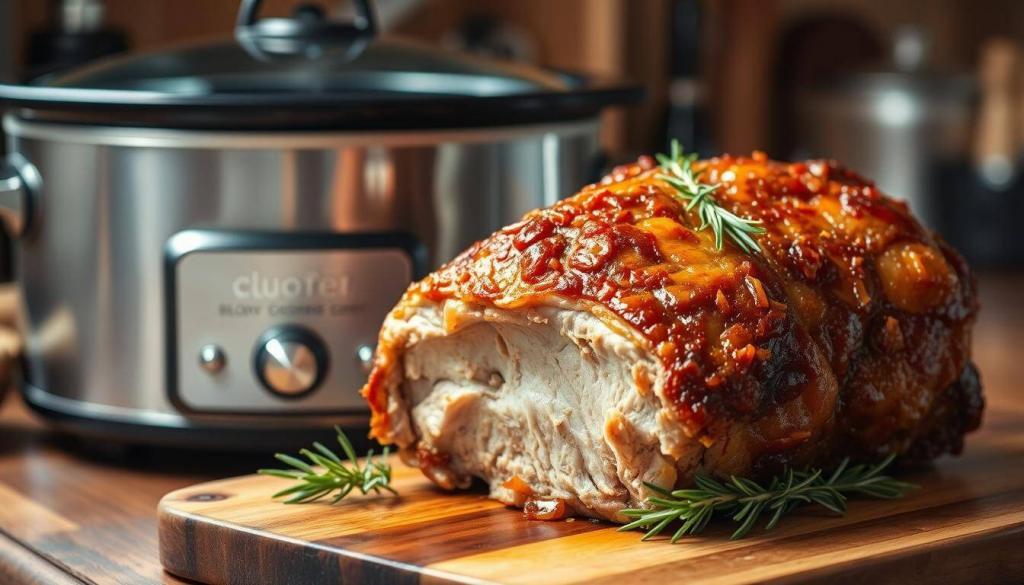
When you cook low and slow for several hours, the collagen in the meat breaks down into gelatin. This creates a melt-in-your-mouth texture that’s hard to resist. Plus, the cooking juices form a rich, savory gravy that ties everything together.
Here’s what makes this dish stand out:
- The “set it and forget it” convenience makes it perfect for busy days.
- You can customize it with your favorite herbs and veggies for a personal touch.
- One reader shared, “My kids couldn’t get enough—it’s now a weekly request!”
Whether you’re hosting a gathering or meal prepping for the week, this recipe delivers. It’s versatile, flavorful, and incredibly easy to make. Give it a try and see why it’s a family favorite!
Ingredients for the Perfect Boneless Pork Shoulder Roast
Ready to gather the essentials for a flavorful dish? Here’s what you’ll need to create a savory masterpiece. Start with 2½-3 lbs of boneless pork shoulder, which is perfect for slow cooking. A spice rub with garlic and onion powder adds depth to the flavor. Don’t forget low-sodium chicken broth for a healthier gravy option.
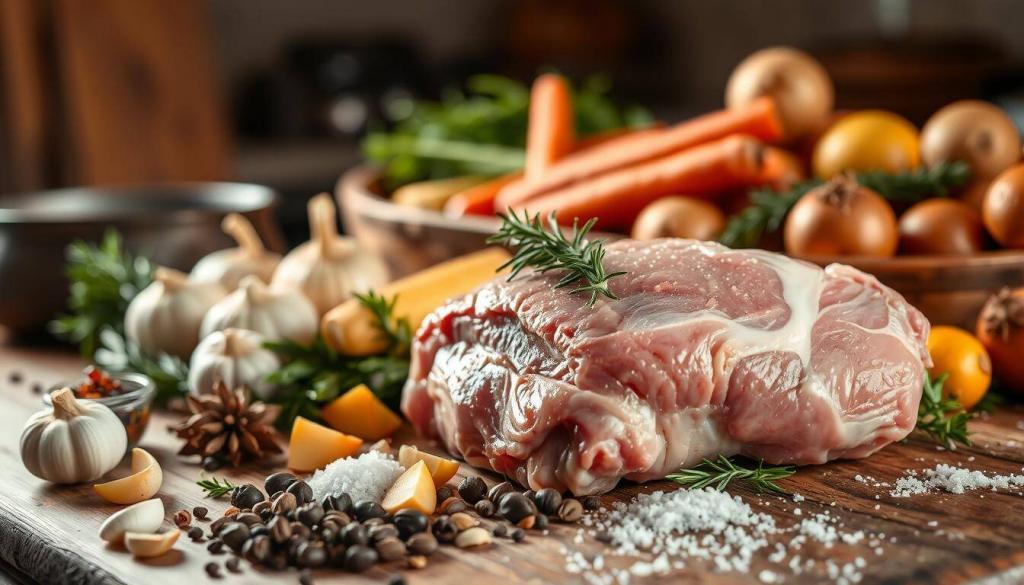
Avocado oil is our top pick for searing. It handles high heat well, creating a caramelized crust that locks in juices. For the gravy, cornstarch is optional but highly recommended for a rich, smooth texture.
Here are some handy tips and substitutions:
- Use apple cider vinegar instead of wine for a tangy twist.
- Italian seasoning can replace individual herbs for convenience.
- Fresh herbs? Use three times the amount of dried ones for the same flavor.
- Make extra spice rub and store it for future recipes.
With these ingredients and tips, you’re all set to create a dish that’s both delicious and easy to prepare. Let’s move on to the next step!
Preparing Your Pork Shoulder for the Slow Cooker
Ready to prep your meat for a delicious meal? Let’s start with the basics. First, pat the meat dry with paper towels. This helps the seasoning stick better and ensures a flavorful crust. Next, crush dried rosemary to release its oils. This small step makes a big difference in taste.
Apply your spice rub generously. Use your hands to massage it into the meat fibers. This ensures every bite is packed with flavor. Don’t forget to trim excess fat. While some fat adds flavor, too much can make the dish greasy.
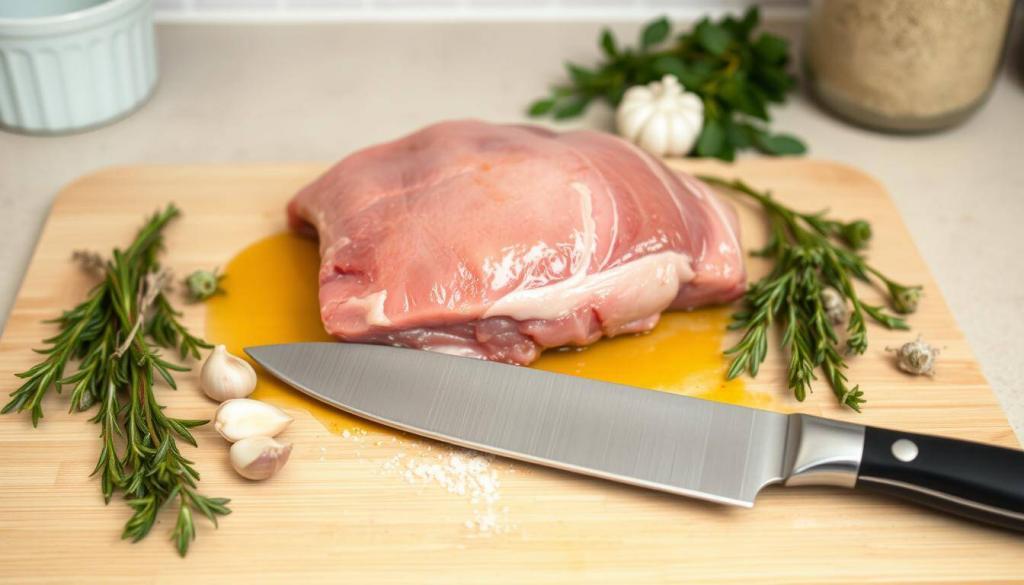
Dry brining with salt is a game-changer. It draws out moisture, which then gets reabsorbed, making the meat juicier. Let it sit for at least 30 minutes before cooking. Always handle raw meat with care. Wash your hands and surfaces thoroughly to avoid cross-contamination.
For busy cooks, prep ahead. Season the meat the night before and store it in the fridge. This saves time and enhances flavor. Here’s a quick summary of the key steps:
| Step | Details |
|---|---|
| Pat Dry | Use paper towels to remove moisture. |
| Crush Rosemary | Release oils for better flavor. |
| Apply Rub | Massage spices into the meat fibers. |
| Trim Fat | Remove excess for a balanced dish. |
| Dry Brine | Use salt to enhance juiciness. |
| Food Safety | Wash hands and surfaces after handling raw meat. |
With these tips, you’re ready to move on to the next step. Preparing your meat properly ensures a tender and flavorful result every time.
How to Sear the Pork Shoulder for Maximum Flavor
Searing is the secret to unlocking deep, rich flavors in your dish. It creates a caramelized crust that locks in juices and adds depth to every bite. Start by heating a cast iron skillet over medium-high heat. Add a tablespoon of oil and let it shimmer before placing the meat in the pan.
Cook for about 2 minutes per side until you achieve a golden-brown crust. Avoid moving the meat around too much—this ensures even browning. If you’re using stainless steel, the process is similar, but cast iron retains heat better for consistent results.
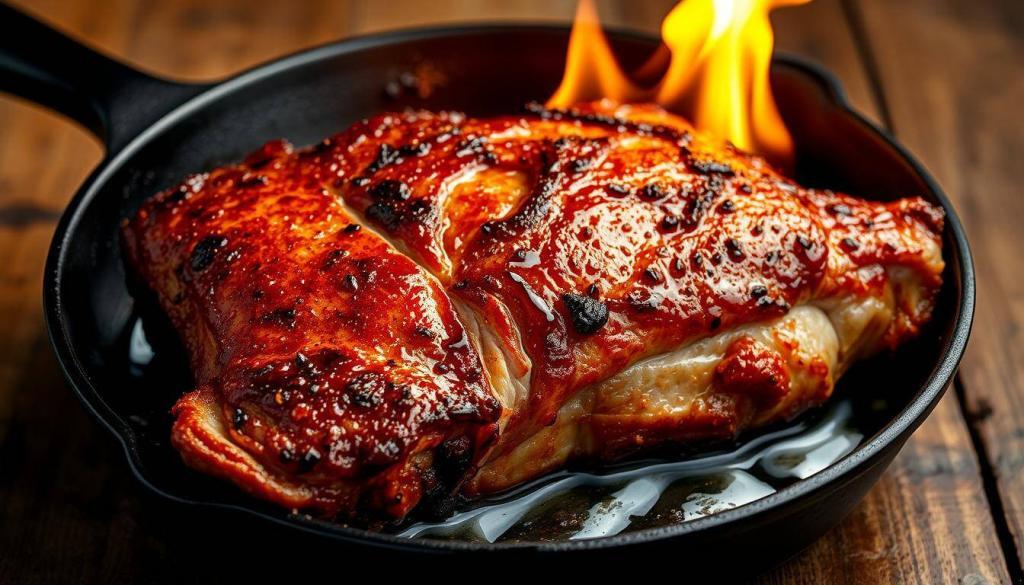
Once seared, deglaze the pan with a broth or wine mixture. Scrape the browned bits, or fond, from the bottom of the skillet. These bits are packed with flavor and will enhance your gravy. Here’s how to troubleshoot common searing mistakes:
- If the meat sticks, your pan isn’t hot enough. Test the heat by sprinkling a few drops of water—they should sizzle and evaporate quickly.
- To avoid burning, monitor the heat and adjust as needed. A golden crust is the goal, not charring.
- Always deglaze immediately after searing to capture all the flavorful bits.
With these tips, you’ll master the art of searing and elevate your dish to the next level. Let’s move on to setting up your slow cooker!
Setting Up Your Slow Cooker for the Pork Roast
Setting up your slow cooker correctly ensures a perfectly cooked meal every time. Start by placing a layer of sliced onions at the bottom of the pot. This prevents sticking and adds a subtle sweetness to the dish.
Next, add your liquid. We recommend at least ½ cup of broth to keep everything moist. This also helps create a flavorful gravy later. For an extra boost of flavor, tuck a bundle of fresh herbs like thyme or rosemary into the mix.
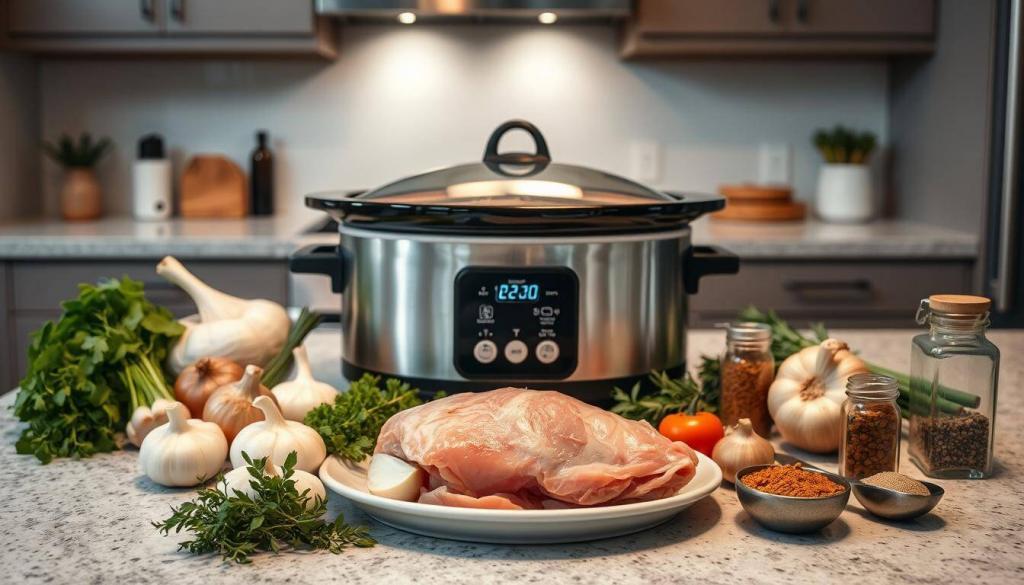
When it comes to vegetables, cut them into uniform chunks. Potatoes and carrots should be about 1-2 inches in size. This ensures even cooking and prevents some pieces from becoming mushy while others remain undercooked.
Layering is key. Place the meat on top of the vegetables, allowing the juices to drip down and flavor them. If your pot isn’t full, use a parchment paper lid to trap heat and moisture. This hack is especially useful for smaller batches.
Finally, consider altitude adjustments. If you’re cooking at high altitudes, you may need to increase the cooking time slightly. With these tips, your slow cooker will be ready to work its magic!
Cooking Your Boneless Pork Shoulder Roast to Perfection
Cooking your meat to perfection requires patience and the right technique. For the best results, set your slow cooker to low heat and let it work its magic for 8-10 hours. This extended cooking time allows the collagen to break down, resulting in a tender and juicy dish.
To ensure your meat is ready, check the internal temperature. It should reach 195-205°F for easy shredding. Avoid opening the lid during cooking, as this can release heat and extend the cooking time. Trust the process—your patience will be rewarded with a melt-in-your-mouth texture.
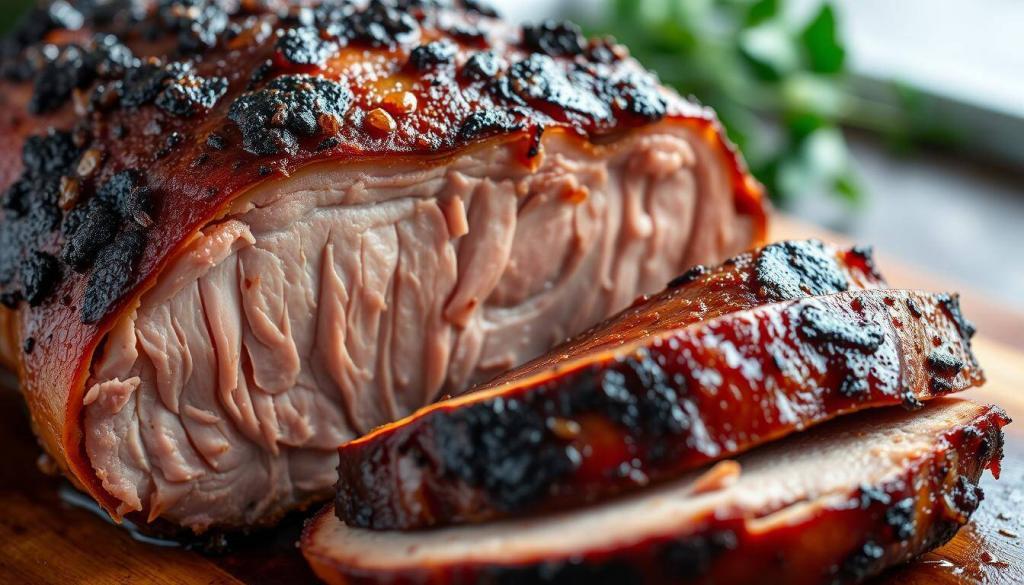
- Low vs. High Heat: Cooking on low heat yields a more tender result, while high heat can speed up the process but may leave the meat slightly firmer.
- Visual Doneness Indicators: The meat should pull apart easily with a fork, and the juices should run clear.
- Slow Cooker Variations: Different brands may cook at slightly different temperatures, so adjust your cooking time accordingly.
- Carryover Cooking: Even after turning off the heat, the meat continues to cook for a few minutes. Factor this into your timing.
- Underdone Roast Solutions: If your meat isn’t tender enough, return it to the slow cooker and cook for an additional hour.
With these tips, you’ll achieve a perfectly cooked dish every time. Let’s move on to making the gravy!
Making the Gravy: A Flavorful Addition to Your Pork Roast
Let’s elevate your dish with a rich, homemade gravy. Start by collecting 1½ cups of the cooking liquid from your slow cooker. This forms the base of your sauce and is packed with flavor.
To separate the fat, use a fat separator or let the liquid cool slightly. Skim the fat off the top with a spoon. This step ensures your gravy isn’t overly greasy.
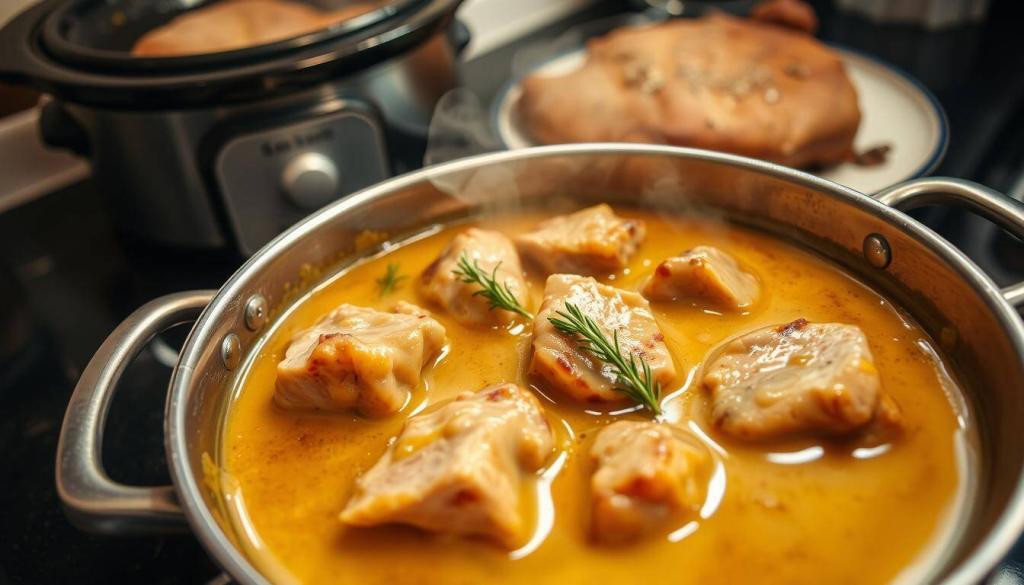
For thickening, mix 1 tablespoon of cornstarch with 2 tablespoons of cold water to create a slurry. Add this to your broth and simmer for 3-5 minutes, stirring constantly. The gravy will thicken as it cooks.
Here’s a quick comparison of thickening agents:
| Thickener | Properties |
|---|---|
| Cornstarch | Creates a glossy, smooth texture. Use for immediate serving. |
| Arrowroot | Gluten-free and works well at lower temperatures. Ideal for reheating. |
For extra flavor, consider adding a teaspoon of Dijon mustard or a handful of fresh herbs like thyme or rosemary. These small additions can make a big difference.
If you’re making gravy ahead of time, store it in an airtight container in the fridge for up to 3 days. Reheat gently on the stove, adding a splash of broth if needed to adjust the consistency.
With these tips, you’ll have a delicious gravy that complements your meal perfectly. Enjoy!
Tips for the Best Slow Cooker Pork Shoulder Roast
Want to take your cooking game to the next level? These tips will help. Whether you’re short on time or looking for ways to enhance flavor, we’ve got you covered.
First, sear your meat even if you’re in a hurry. This step locks in juices and adds a rich, caramelized crust. For veggies, use whole baby potatoes. They hold their shape better and absorb flavors beautifully.
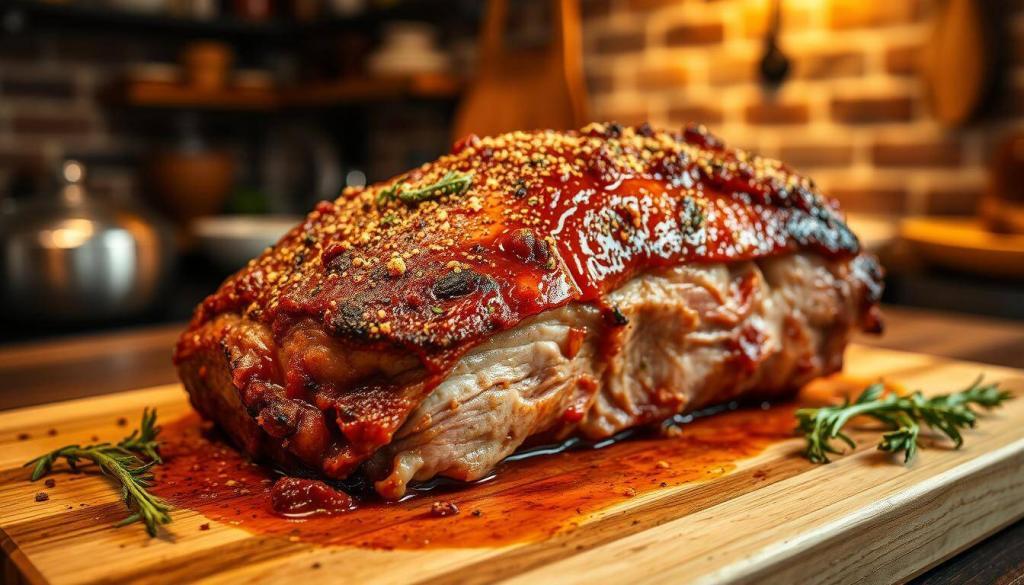
Fresh herbs can elevate your dish, but dried alternatives work too. Use three times the amount of dried herbs if fresh ones aren’t available. Here’s a quick comparison of marinating vs dry rub benefits:
| Method | Benefits |
|---|---|
| Marinating | Deepens flavor and tenderizes meat over time. |
| Dry Rub | Creates a flavorful crust and works quickly. |
To protect veggies from overcooking, place them on the bottom of the crockpot. This shields them from direct heat. For moisture retention, tent your roast with foil during the last hour of cooking.
Resting your meat before slicing is crucial. It allows juices to redistribute, ensuring every bite is tender. If your roast turns out dry, don’t panic. Shred it and mix with broth or gravy to salvage the dish.
With these tips, you’ll create a meal that’s flavorful, tender, and perfect every time. Happy cooking!
Serving Suggestions for Your Slow Cooker Pork Roast
Transform your dish into a showstopper with these serving ideas. Whether you’re hosting a holiday dinner or enjoying a casual meal, these tips will elevate your presentation and flavor.
For a classic side, try smashed potatoes. Boil baby potatoes until tender, then gently smash them with a fork. Drizzle with olive oil, sprinkle with salt, and roast until crispy. Pair them with carrots roasted in honey and thyme for a sweet and savory combo.
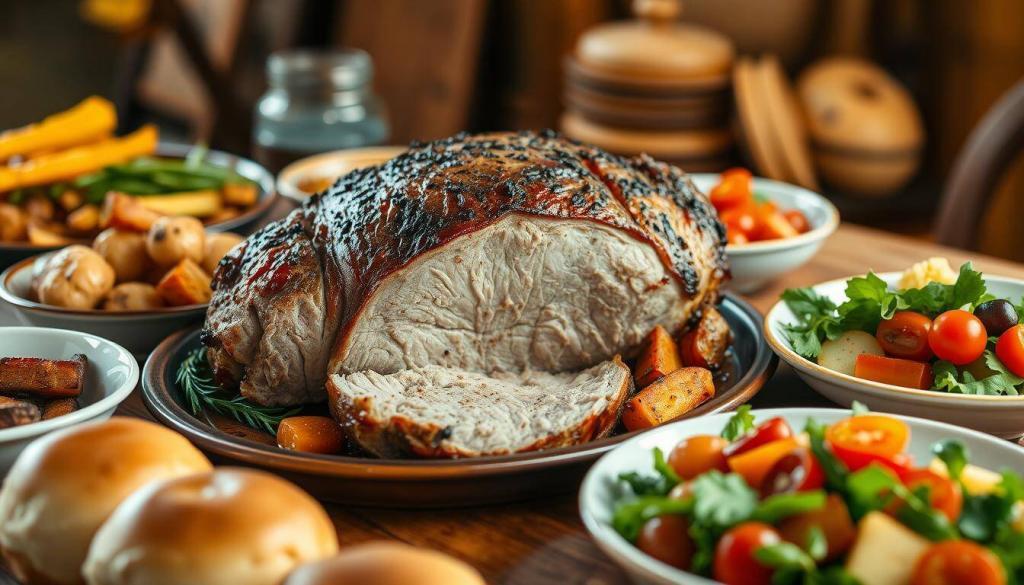
Want to switch things up? Turn your roast into pulled pork sandwiches. Shred the meat, toss it in BBQ sauce, and serve on toasted buns. Add coleslaw for a crunchy contrast. It’s perfect for a quick lunch or dinner.
For holiday meals, carve the roast into thick slices and arrange them on a platter. Surround it with seasonal veggies like roasted Brussels sprouts and sweet potatoes. Garnish with fresh herbs or citrus zest for a pop of color.
Here are some additional ideas to inspire you:
- Starch Alternatives: Swap potatoes for polenta or rice for a unique twist.
- Carving Techniques: Slice against the grain for tender, visually appealing pieces.
- Garnish Options: Use parsley, thyme, or lemon zest to add freshness and brightness.
Pair your meal with the perfect drink. Here’s a quick guide:
| Drink | Pairing |
|---|---|
| Red Wine | Cabernet Sauvignon or Merlot |
| Beer | Amber Ale or Stout |
| Non-Alcoholic | Sparkling Apple Cider |
For next-day lunches, use leftovers in tacos, salads, or grain bowls. It’s a versatile dish that keeps on giving. With these serving suggestions, your meal will be a hit every time!
Storing and Reheating Your Leftover Pork Roast
Got leftovers? Here’s how to keep them fresh and flavorful. Proper storage ensures your meal stays delicious for days. Let’s dive into the best practices for storing and reheating.
For fridge storage, place your leftovers in an airtight container. They’ll stay fresh for up to 3 days. If you’re planning to freeze, portion the meat into meal-sized servings. This makes it easier to thaw and reheat later. Frozen leftovers can last up to 3 months.
When it’s time to reheat, a skillet is your best friend. It helps retain moisture and prevents drying. Heat the skillet over medium heat and add a splash of broth or water. This keeps the meat juicy and flavorful. Reheat for about 5-10 minutes, stirring occasionally.
Here are some additional tips to make the most of your leftovers:
- Vacuum-Sealing: This method locks in freshness and prevents freezer burn.
- Anti-Drying Methods: Add a bit of broth or gravy when reheating to keep the meat moist.
- Frozen Meal Prep: Freeze individual portions with gravy for quick, ready-to-eat meals.
- Gravy Separation Solutions: If your gravy separates, whisk it gently over low heat to bring it back together.
With these tips, your leftovers will taste just as good as the first time. Enjoy!
Why This Boneless Pork Shoulder Roast Will Become a Family Favorite
Discover a dish that’s not only delicious but also sustainable and budget-friendly. With a 96% reader approval rating, this recipe is a hit for good reason. Certified by the Minnesota Pork Board, it’s a testament to modern pork farming’s commitment to sustainability and quality.
Nutritionally, this meal is a winner. Compared to beef, it’s leaner and packed with essential vitamins like B12. At just a few dollars per serving, it’s an affordable way to feed your family without compromising on flavor or quality.
Versatility is another standout feature. Whether you’re following a specific diet or just looking for meal prep ideas, this dish adapts easily. From tacos to salads, the possibilities are endless.
Chefs rave about the depth of flavor achieved by cooking low and slow. One professional shared, “The caramelized crust and tender texture make it unforgettable.” Give it a try and see why it’s destined to become a family favorite.
Footer 1
Call the HERD
Always available for any questions. Call and we will be happy to help.
Follow the HERD
Keep up to date on new products available in store.
Important Links
Join the HERD
Be the first to know about any offers or promotions.
- Herd Butchery 2025

Leave a Reply